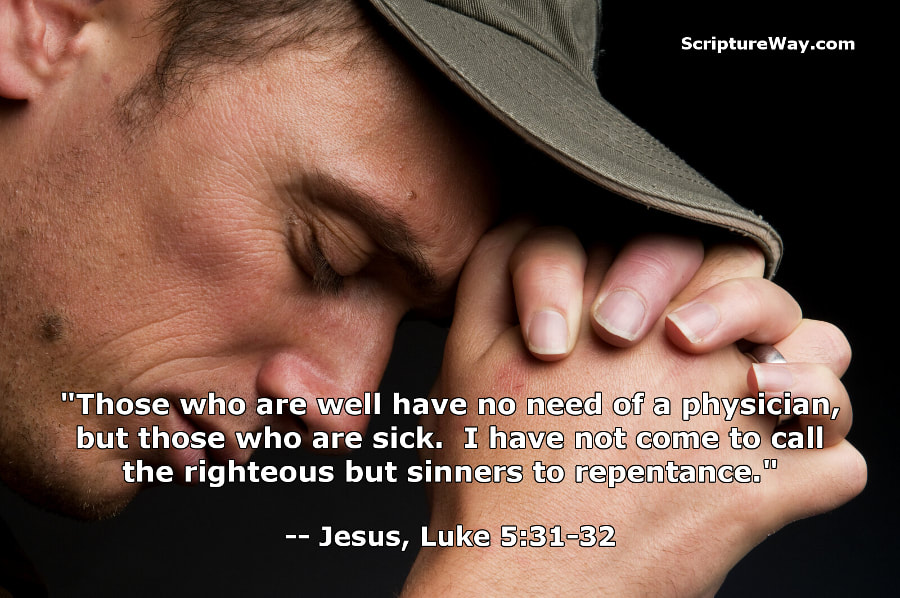Consider. Jesus came to be the Great Physician for people afflicted with the greatest disease -- sin. Jesus calls sinners -- then and now -- to repentance.
Read Luke 5:27-32
Jesus Calls Levi (Matthew)
"27 After this he went out and saw a tax collector named Levi, sitting at the tax booth. And he said to him, 'Follow me.' 28 And leaving everything, he rose and followed him.
29 And Levi made him a great feast in his house, and there was a large company of tax collectors and others reclining at table with them. 30 And the Pharisees and their scribes grumbled at his disciples, saying, 'Why do you eat and drink with tax collectors and sinners?' 31 And Jesus answered them, 'Those who are well have no need of a physician, but those who are sick. 32 I have not come to call the righteous but sinners to repentance.'"
The Luke 5:27-32 scripture includes "tax collectors," "sinners," "Pharisees," and "scribes." A related lesson defines who these people groups were. For an explanation, please refer to "Jesus Receives Sinners - Then and Now" (Ref. 1, Luke 15:1-2).
1. Who needs the Great Physician?
As the spiritual Physician, Jesus gracefully went about his work with the people who needed him the most -- people who were diseased with sin. God draws such people -- then and now -- to Jesus (Luke 15:1). Jesus came to be with sinful people -- people the Pharisees and scribes held in contempt. Jesus conversed with them, instructed them, and called them to repentance (will discuss more in Section 3).
In contrast with the tax collectors and sinners who welcomed Jesus, the Pharisees and scribes did not see their need for Jesus. In their own opinion of themselves, they were free from the taint of sin. Thus, they thought (falsely) that they were well. When a person -- then and now -- thinks they are free from sin, they deceive themselves. "If we say we have no sin, we deceive ourselves, and the truth is not in us" (1 John 1:8).
2. Who does Jesus call to repentance?
Jesus said, "I have not come to call the righteous but sinners to repentance" (Luke 5:32).
Jesus said that he had come to call sinners to repentance. "Sinners," in the Biblical technical sense, are hamartólos, people who miss the mark of what God approves (Ref. 2). That actually includes all of us. "For all have sinned and fall short of the glory of God" (Romans 3:23). In the eyes of the Pharisees and scribes, sinners not only were those with blatant moral problems (such as prostitutes), but also those who did not observe the Pharisees' and scribes' strict and rule-oriented interpretation of the law -- which was most everybody else (Mark 7:5-7). 3. What is repentance?
Jesus said, "I have not come to call the righteous but sinners to repentance" (Luke 5:32, italics added for emphasis).
The biblical definition of repentance means to turn about, to have a change of mind, to express regret (Greek: metanoia, Ref. 2, Ref. 3). Thus, repentance is much more than being superficially sorry for one's sins. Repentance includes a sincere heart change that turns from sin towards God and purposes to lead a more righteous and holy life. The prophet Joel says, "'Yet even now,' declares the Lord, 'return to me with all your heart, with fasting, with weeping, and with mourning; 13 and rend your hearts and not your garments'” (Joel 2:12-13, italics added for emphasis).
God says through the prophet Isaiah, "Turn to me and be saved, all the ends of the earth! For I am God, and there is no other" (Isaiah 45:22). John, the apostle and disciple of Jesus, wrote to believers, "If we confess our sins, he is faithful and just to forgive us our sins and to cleanse us from all unrighteousness" (1 John 1:9). 4. Repentance and belief go together.
Repenting and believing go together. Repentance is integral to our believing in Christ. Note what Jesus said early in his ministry. "Now after John was arrested, Jesus came into Galilee, proclaiming the gospel of God, 15 and saying, 'The time is fulfilled, and the kingdom of God is at hand; repent and believe in the gospel'" (Mark 1:14-15). Not just "repent." Not just "believe." Jesus said, "Repent and believe."
Both repenting of our sins and believing in Christ should be ongoing in our walk with Christ and not just a one-time occasion. Even as believers, when we sin (in thought, word, or deed), we should repent of that sin, receive God's forgiveness already provided for us in Christ's sacrificial death, and continue to walk in the newness of life that God gives us through his Son (1 John 1:9, Matthew 5:21-22, Matthew 5:27-28, Romans 6:4).
Apply. Are you up to date on repenting from any sin that may be affecting your relationship with the Lord? Consider the main principles in this lesson:
2 Comments
|
Daily Bible Verse(Click the link above) AuthorMr. Whitney V. Myers. Christian. For more information, please visit the Author Page. Posting ScheduleI plan to provide new postings about once a month. Planned Topics(subject to change) Recent Posts(most recent three months) Popular Posts(top 10) Categories
All
Archives
July 2024
|
|
Copyright 2018-2024 Whitney V. Myers |
Listed in Feedspot's Top 100 Bible Study Blogs and Websites |

 RSS Feed
RSS Feed
